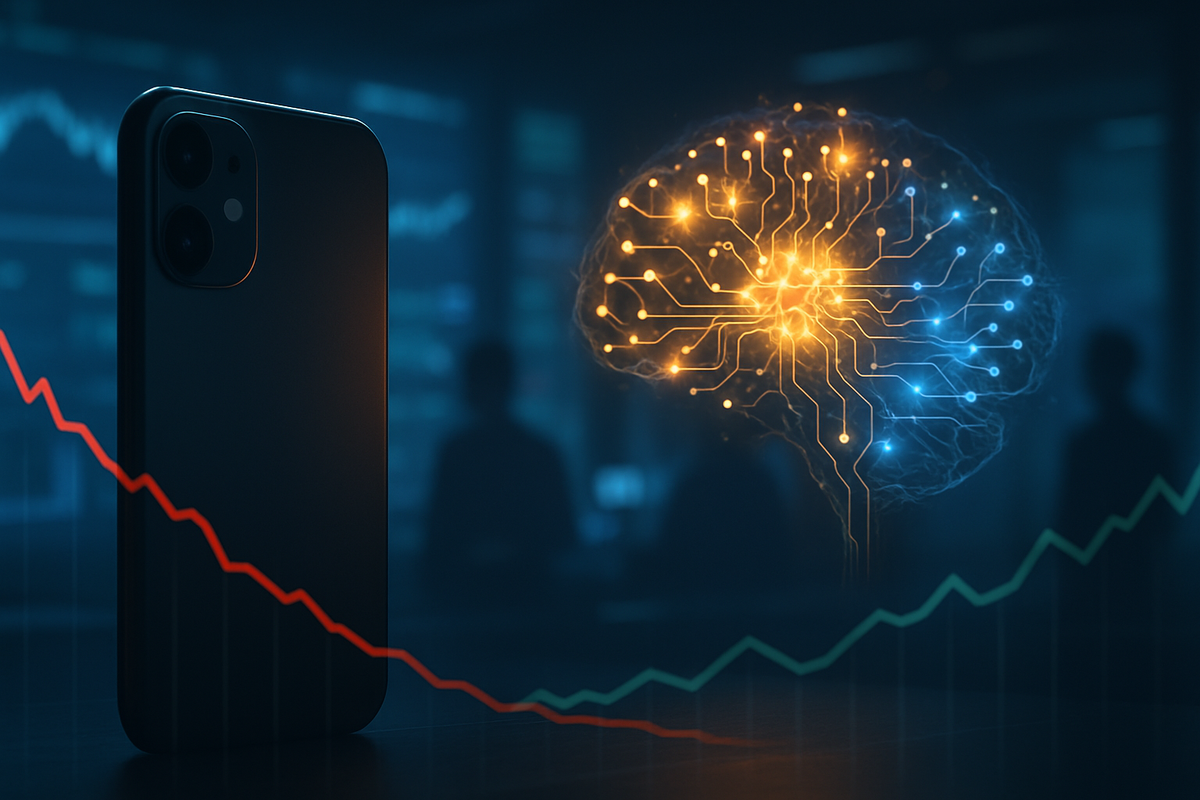
Apple Inc. (NASDAQ: AAPL), long a bastion of innovation and market leadership, finds itself in an unfamiliar position in 2025: a laggard among the tech elite. While its fellow "Magnificent Seven" companies ride a wave of Artificial Intelligence (AI) driven enthusiasm to soaring valuations, Apple's stock has notably declined by approximately 5% year-to-date. This underperformance has sparked significant investor concern and raised questions about the iPhone maker's strategic agility in the rapidly evolving AI landscape, particularly its perceived slower integration and rollout of cutting-edge AI features compared to its rivals.
This challenging performance not only contrasts sharply with the broader market's upward trajectory but also with the explosive growth witnessed by AI-centric powerhouses such as NVIDIA (NASDAQ: NVDA) and Microsoft (NASDAQ: MSFT). As the market increasingly values companies based on their AI prowess, Apple's cautious, often secretive approach to AI development is now being tested, forcing a reevaluation of its future growth prospects and competitive standing.
The AI Perception Gap: Why Apple is Lagging Behind
Apple's 5% year-to-date decline by mid-September 2025 paints a stark picture when compared to the impressive gains of its "Magnificent Seven" counterparts. Alphabet (NASDAQ: GOOGL), NVIDIA (NASDAQ: NVDA), and Meta Platforms (NASDAQ: META) have all delivered YTD returns ranging from 28% to over 33%, while Microsoft (NASDAQ: MSFT) has seen solid gains of over 20%. Even Amazon (NASDAQ: AMZN) and Tesla (NASDAQ: TSLA), despite their own unique challenges, have managed to post single-digit gains or recover from earlier dips. The Roundhill Magnificent Seven ETF (NYSEARCA: MAGS) itself is up 18%, highlighting Apple's distinct underperformance within this exclusive group.
The primary culprit, according to market analysts and investors, is the perception that Apple has been slow to embrace and integrate advanced AI capabilities into its core products and services. While competitors aggressively unveiled and monetized AI-driven innovations following the ChatGPT phenomenon in late 2022, Apple's major AI initiative, "Apple Intelligence," took nearly two years to materialize. This delay has fueled concerns about the company's long-term innovation pipeline and its ability to compete effectively in a world increasingly defined by AI.
Critics point to a perceived lack of a clear, cohesive AI strategy, leading some analysts to downgrade their outlooks for Apple due to "AI differentiation" concerns. While CEO Tim Cook has reiterated a strong commitment to AI, emphasizing internal investment and acquisitions, the market is demanding tangible, user-facing AI features that can rival those offered by companies like Microsoft with its Copilot or Google with its Gemini. The lukewarm initial reception to "Apple Intelligence" and ongoing debates about whether Apple might need significant acquisitions to catch up underscore the depth of this challenge.
Winners and Losers in the AI Race
In the wake of Apple's subdued AI narrative, a clear delineation of winners and losers is emerging within the tech industry. The undisputed winners are those companies that have aggressively embraced and successfully integrated AI into their offerings, driving significant market capitalization growth and attracting investor confidence. NVIDIA (NASDAQ: NVDA), the semiconductor giant, continues its stellar run, fueled by insatiable demand for its high-performance GPUs essential for AI model training. Its YTD returns in the high 20s to low 30s exemplify the direct beneficiary of the AI infrastructure boom.
Similarly, Microsoft (NASDAQ: MSFT) has cemented its position as an AI leader, particularly through its strategic partnership with OpenAI and the successful integration of its Copilot AI assistant across its enterprise software suite. Its consistent YTD gains of over 20% reflect investor confidence in its hybrid cloud (Azure) and productivity software's AI future. Alphabet (NASDAQ: GOOGL) and Meta Platforms (NASDAQ: META) have also seen substantial gains, leveraging their vast data resources and research capabilities to roll out advanced AI features in search, advertising, and social media, capturing investor enthusiasm with YTD returns often exceeding 28%. These companies are capitalizing on the market's hunger for AI-driven growth stories, siphoning investor capital that might otherwise have flowed more evenly across the "Magnificent Seven."
On the other side of the ledger, Apple (NASDAQ: AAPL) stands out as a relative loser, at least in the short-to-medium term. Its 5% YTD decline suggests a discount placed on its valuation due to the perceived AI lag. While Apple's immense brand loyalty and robust ecosystem provide a strong foundation, the market is signaling that its traditional strengths are not enough to compensate for a slower AI rollout. This could affect its ability to attract top-tier AI talent, innovate at the pace of its rivals, and maintain premium pricing power if its products are seen as less technologically advanced in key areas. Other companies in Apple's supply chain or those heavily reliant on Apple's product cycles might also experience indirect negative impacts if Apple's growth trajectory continues to be constrained by AI concerns.
Industry Impact and Broader Implications
Apple's challenging performance and the narrative around its AI integration have significant ripple effects across the technology industry, underscoring the profound shift brought about by the AI revolution. This event highlights a crucial industry trend: the AI race is now the defining competitive battleground. Companies that lead in AI development and deployment are not merely gaining a competitive edge; they are reshaping market leadership and investor expectations. Apple's situation serves as a potent reminder that even established giants must adapt swiftly or risk falling behind in this new technological paradigm. The rapid ascent of companies like NVIDIA and the AI-driven resurgence of Meta Platforms demonstrate that agility and aggressive AI investment are paramount.
The potential ripple effects on competitors and partners are multifaceted. For direct competitors in the smartphone and computing space, such as Samsung (KRX: 005930) and Google (NASDAQ: GOOGL) with its Pixel line, Apple's perceived AI weakness could create an opportunity to capture market share by emphasizing their own AI innovations. Partners in the AI ecosystem, particularly chip manufacturers and software developers, might prioritize collaborations with companies demonstrating a more aggressive AI roadmap. Conversely, companies whose fortunes are closely tied to Apple's ecosystem, such as accessory makers or specific app developers, might face indirect pressures if Apple's overall growth trajectory continues to be constrained by AI concerns.
From a regulatory standpoint, Apple's focus on privacy-centric, on-device AI might position it favorably against increasing scrutiny over data privacy, a growing concern in the broader AI ethics debate. However, if its privacy-first approach leads to functionality gaps compared to cloud-dependent AI systems, it could face pressure from consumers demanding parity in features. Historically, there are parallels to periods where technological shifts, such as the rise of the internet or mobile computing, similarly challenged incumbent leaders. Companies that were slow to adapt, like some traditional software or hardware firms, found their market positions eroded. Apple's current predicament echoes these past transitions, suggesting that even a market leader is not immune to fundamental shifts in technological paradigms. The current situation might accelerate calls for more open AI standards or partnerships across the industry, as no single company can unilaterally dominate every aspect of AI.
What Comes Next for Apple
The immediate future for Apple (NASDAQ: AAPL) hinges on its ability to execute a convincing and impactful AI strategy. In the short-term, investors will be closely watching for concrete product announcements and feature rollouts that demonstrate significant progress in AI integration beyond the initial "Apple Intelligence" offerings. The upcoming product cycles, particularly for the iPhone and Mac lines, will be critical litmus tests for the company's ability to embed truly differentiated AI experiences that resonate with consumers and justify its premium pricing. Any further delays or underwhelming announcements could exacerbate negative investor sentiment and potentially lead to further stock price volatility. Market analysts will be scrutinizing adoption rates of new AI features and their perceived value proposition against offerings from rivals.
In the long-term, Apple faces several strategic pivots and adaptations. The company may need to accelerate its M&A activity in the AI space, targeting specialized startups or technologies to rapidly bridge any perceived gaps with competitors. There's also a possibility of a more significant shift in its traditionally closed ecosystem, potentially exploring partnerships or more open AI frameworks to leverage external innovation, much like its initial foray into search with Google. The focus on privacy-first, on-device AI remains a potential differentiator, but Apple must demonstrate that this approach doesn't compromise on functionality or user experience compared to cloud-centric AI solutions. Market opportunities may emerge in new AI-driven hardware categories, such as advanced mixed-reality devices, where Apple could apply its strengths in industrial design and integrated software/hardware experiences.
Potential scenarios range from a successful strategic pivot where Apple effectively integrates AI to reassert its leadership, driving a significant rebound in its stock, to a more challenging scenario where persistent AI lag leads to slower growth, market share erosion, and a re-rating of its valuation. The company could also lean more heavily into its services segment, infusing AI into subscription offerings to bolster recurring revenue, even if hardware growth remains constrained. A key challenge will be managing investor expectations while navigating the complex and rapidly evolving AI landscape, ensuring that its innovation pipeline is not only robust but also visibly competitive.
Conclusion: Apple at a Crossroads
Apple's 5% year-to-date stock decline in 2025 represents a critical juncture for the tech titan, underscoring the profound impact of the Artificial Intelligence revolution on market dynamics and investor perception. The primary takeaway is clear: in the current technological climate, perceived leadership (or lag) in AI integration directly translates to significant shifts in market capitalization and investor confidence. Apple's cautious, often deliberate approach to AI has, for now, placed it behind its "Magnificent Seven" peers, who have aggressively showcased and monetized their AI prowess, leading to a noticeable divergence in their stock performances.
Moving forward, the market will intently watch how Apple navigates this AI-centric environment. Its ability to innovate, integrate, and effectively communicate its AI strategy will be paramount. Investors should monitor several key indicators: the pace and impact of "Apple Intelligence" feature rollouts, any strategic acquisitions or significant AI partnerships, and the competitive landscape for AI-infused consumer hardware and services. A successful pivot could see Apple leveraging its immense ecosystem and brand loyalty to reclaim its growth narrative, potentially with its privacy-centric AI as a key differentiator.
However, sustained underperformance in AI could challenge its premium valuation and market leadership. The coming months will be crucial for Apple to demonstrate that its long-standing commitment to thoughtful innovation can translate into a compelling AI future that reignites investor enthusiasm. The saga of Apple's AI journey is a microcosm of the broader tech industry's transformation, serving as a powerful reminder that even the most established giants must continuously evolve to maintain their prominence in an era defined by rapid technological change.






